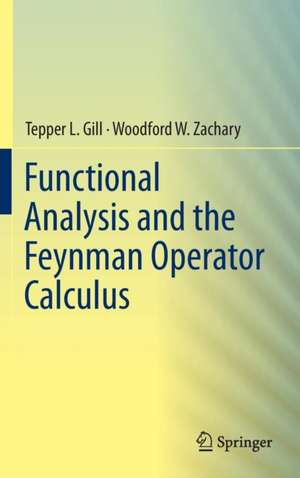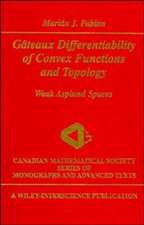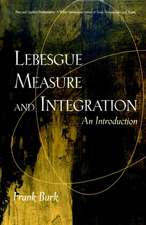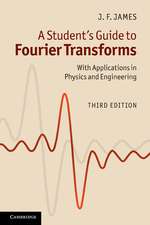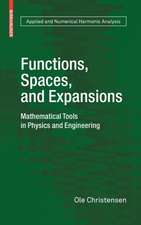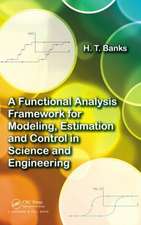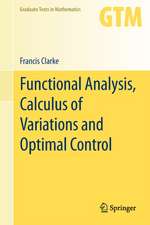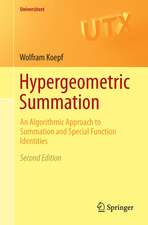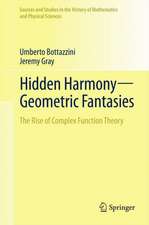Functional Analysis and the Feynman Operator Calculus
Autor Tepper Gill, Woodford Zacharyen Limba Engleză Hardback – 8 apr 2016
| Toate formatele și edițiile | Preț | Express |
|---|---|---|
| Paperback (1) | 909.75 lei 6-8 săpt. | |
| Springer International Publishing – 25 apr 2018 | 909.75 lei 6-8 săpt. | |
| Hardback (1) | 737.54 lei 6-8 săpt. | |
| Springer International Publishing – 8 apr 2016 | 737.54 lei 6-8 săpt. |
Preț: 737.54 lei
Preț vechi: 899.44 lei
-18% Nou
Puncte Express: 1106
Preț estimativ în valută:
141.14€ • 145.82$ • 117.40£
141.14€ • 145.82$ • 117.40£
Carte tipărită la comandă
Livrare economică 20 martie-03 aprilie
Preluare comenzi: 021 569.72.76
Specificații
ISBN-13: 9783319275932
ISBN-10: 3319275933
Pagini: 360
Ilustrații: XIX, 354 p. 3 illus. in color.
Dimensiuni: 155 x 235 x 22 mm
Greutate: 0.73 kg
Ediția:1st ed. 2016
Editura: Springer International Publishing
Colecția Springer
Locul publicării:Cham, Switzerland
ISBN-10: 3319275933
Pagini: 360
Ilustrații: XIX, 354 p. 3 illus. in color.
Dimensiuni: 155 x 235 x 22 mm
Greutate: 0.73 kg
Ediția:1st ed. 2016
Editura: Springer International Publishing
Colecția Springer
Locul publicării:Cham, Switzerland
Public țintă
ResearchCuprins
Preliminary Background.- Integration on Infinite-dimensional Spaces.- HK-Integral and HK-Spaces.- Analysis on Hilbert Space.- Operators on Banach Space.- Spaces of von Neumann Type.- The Feynman Operator Calculus.- Applications of the Feynman Calculus.
Recenzii
“The book is a self-contained treatise on the mathematical foundation of Feynman operational calculus and Feynman path integrals. … It contains a large amount of original material which cannot be found elsewhere in book form; in fact, most of the original results are due to the authors themselves. … The book will be of interest to both graduate students and researchers in pure or applied mathematics.” (Sonia Mazzucchi, Mathematical Reviews, November, 2016)
“This book carries Fujiwara's insight to provide the mathematical frameworks for Feynman's operator calculus and for the Feynman path integral. … The book is intended for advanced graduate students and researchers and can be used as a text for advanced courses in functional analysis, operator theory, mathematical physics, or related subjects.” (Miyeon Kwon, zbMATH 1345.81001, 2016)>
“This book carries Fujiwara's insight to provide the mathematical frameworks for Feynman's operator calculus and for the Feynman path integral. … The book is intended for advanced graduate students and researchers and can be used as a text for advanced courses in functional analysis, operator theory, mathematical physics, or related subjects.” (Miyeon Kwon, zbMATH 1345.81001, 2016)>
Textul de pe ultima copertă
This book provides the mathematical foundations for Feynman's operator calculus and for the Feynman path integral formulation of quantum mechanics as a natural extension of analysis and functional analysis to the infinite-dimensional setting. In one application, the results are used to prove the last two remaining conjectures of Freeman Dyson for quantum electrodynamics. In another application, the results are used to unify methods and weaken domain requirements for non-autonomous evolution equations. Other applications include a general theory of Lebesgue measure on Banach spaces with a Schauder basis and a new approach to the structure theory of operators on uniformly convex Banach spaces. This book is intended for advanced graduate students and researchers.
Caracteristici
Provides a mathematically rigorous formulation of both the path integral and the operator calculus in the manner intended by Feynman Unifies the theory of partial differential equations with time-dependent coefficients using Feynman's theory Provides the first introduction to Lebesgue integration on Banach spaces Includes a direct approach to the study of time-dependent evolution equations in both finite and infinite-dimensional settings Solves the second of the two open Dyson conjectures
